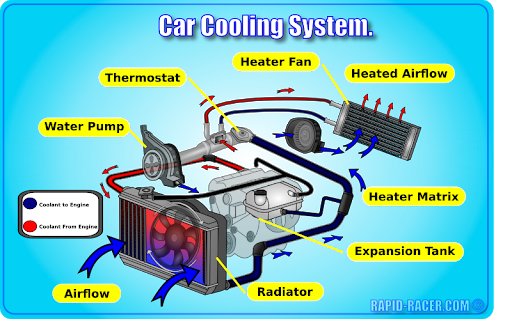Posted on 9/1/2020

Gilbert drivers often ask questions about the cooling system, the system that cools your vehicle engine and keeps it at the proper operating temperature. Let’s examine the topic in two areas: first, the coolant itself and second, the parts that make up the cooling system. The coolant is the mix of water and antifreeze that circulates through the engine to draw off heat. First, you need to have the proper amount. If you don’t have enough coolant, it can’t keep your vehicle engine cool. You also need the right kind of coolant. Different makes of vehicles require different coolant formulation to protect against corrosion. Finally, your coolant needs to be fresh. Over time and miles of driving, the anti-corrosion additives in the coolant are depleted, and the coolant can actually start to eat away at the vehicle's cooling system parts. Your owner’s manual and your Spectrum Car Care service advisor can help you with ... read more
Posted on 8/13/2018
We all know how important the cooling system is. Coolant/antifreeze circulates around the engine, absorbs heat and then dissipates it in the radiator. Cooling system failure can cause extensive engine damage. There are a couple of fine points that may be useful to you. One is about minor coolant leaks. It’s tempting to put off repairing small cooling system leaks; we just keep topping off the coolant. There are several problems with this. First, coolant is messy. It doesn’t just evaporate away. The puddle is harmful to the environment and is toxic to pets. Second, the cooling system needs to maintain a certain pressure to do its job. A leak compromises the pressure. Third, small leaks can unexpectedly become big leaks that leave you stranded. Fourth, you need to keep the correct balance of coolant/antifreeze and distilled water to maintain proper boil and freeze properties. Another point is corrosion protection. Antifreeze/coolant contains a package of anti-corrosion addi ... read more
Posted on 10/9/2016

In our last post we detailed how to check 3 of the 7 fluids that you can find in your car. Now we’ll take a look at the other four; the coolant, power steering fluid, transmission fluid and windshield wiper fluid. When you check your coolant levels you need to check the coolant overflow reservoir. This reservoir has little markings on it that show you coolant levels when the engine is hot or cold. If the levels are too low you need to add more coolant to the radiator, but you should never open the radiator cap with a hot engine because this could result in serious injuries. Power steering fluid is different from engine coolant in that it can be checked while it’s warm. In fact some manufacturers will suggest you warm up the engine while others will suggest keeping it cool. That’s why you should consult the owner’s manual for your car to see what the recommendation is for your car. To check the fluid levels you need to first find the power steering tank and tak ... read more